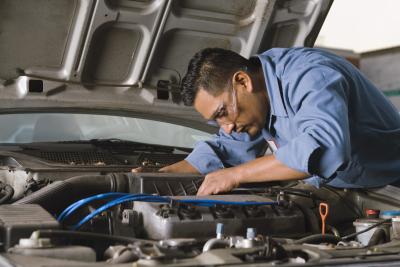
A periodic tune-up helps car engines run cleaner, improves gas mileage, increases its lifespan and saves you money. Late model vehicles with the newest electronic ignitions, spark plugs and fuel injection systems may only need a tune-up every 60,000 miles. These engines are manufactured with better materials and fewer moving parts and practically tune themselves. At tune-up time, they often only require new spark plugs and wires. Older vehicles have more mechanical parts and need more attention. Models from the 1980s and earlier may require tune-ups every 12,000 miles and you should expect to replace filters, ignition components and emission control valves. Your vehicle may have all or some of these components, depending on the year it was manufactured, so refer to the vehicle’s service manual for more details.
An air filter helps control the mixture of fuel and air for engine combustion by keeping dirt particles out of the system. If not replaced, the filter eventually becomes clogged, causing the emission control system to work inefficiently, the spark plugs to foul and the engine to run poorly.
The fuel filter plays a complementary role in how fuel is burned in the combustion process. Fuel picks up contaminants, including dirt and rust. If there is no filter to remove these particles, they will create wear on the fuel pump and injectors, resulting in poor performance and inevitable replacement of those more expensive components.

A spark plug facilitates the arcing of a spark across a gap at its end. This spark ignites fuel within the combustion chamber to push the pistons, turn the crank shaft and power the vehicle down the road. Plugs wear out for various reasons, including carbon buildup, overheating or corrosion. Worn plugs will cause the engine to burn fuel inefficiently and run poorly.
Spark plug wires connect spark plugs to the distributor, which relays electrical current from the coil. These wires don't wear as quickly as other parts, but should be inspected for any cracks or breaks in the insulation.

The distributor routes electricity from the coil to the spark plugs. Rust, corrosion or burning at either the connectors at the top of its cap or on the metal contacts inside the cap will disrupt the strength and timing of engine spark. The result can be engine misfire and reduced performance.
The rotor sits on top of the distributor, inside the cap. It spins around, sending an electrical spark to each of the cap's contacts as it passes by. Over time, this arcing of electrical spark between the rotor and the contacts causes the tip of the rotor to wear out.

The points and condenser usually exist as a single unit seated on a plate at the top of the distributor just below the rotor. They control the timing of electrical current to the spark plugs. This perpetual sparking eventually causes the points to become pitted and adversely affects performance.
The PCV valve controls the flow of gases created by the combustion process. It can become clogged with sludge, which reduces the amount of air the engine receives and the power it delivers. If the PCV valve is not replaced at the proper interval, the engine will begin to leak oil.
There may be several belts on your engine driving various components like the alternator and power steering and water pumps. Belts often last 60,000 miles, but should be inspected regularly for cracks and fraying. If a belt breaks while you're on the road, you could lose all electrical power or the ability to cool your engine, both of which could lead to expensive repair bills.
